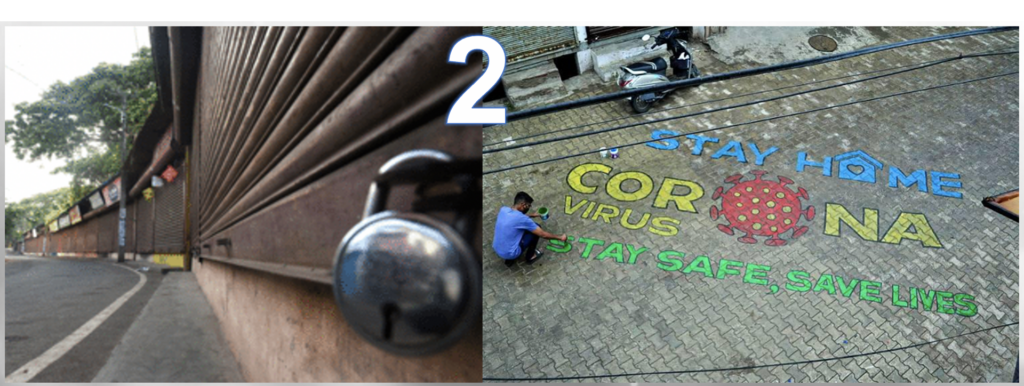Repurposing Production Lines & Retooling Operations - Enterprises Lead the Charge Against COVID-19

Edit 02April2020 – Added ITC, DRDO & NIVEA India to the list of companies from India and LTP Group to the worldwide list.
The year 2019 ended in dramatic fashion – when, on 31st December 2019, China reported to the WHO County Office there, the detection of a “pneumonia of unknown cause” in Wuhan, Central China’s most populated city and the sprawling capital of Hubei province. What started as an epidemic mainly limited to China is now a world-wide emergency having affected more nearly 177 countries and territories (more than 755,000 confirmed cases and more than 36,000 fatalities) at the time of penning this.
The COVID-19 outbreak poses unprecedented challenges to people, societies, businesses, states and countries across the world. The scale of impact right now is unpredictable and with no immediate end in sight. No wonder, as fashion journalist, Jasmin Malik Chua noted in a tweet of hers, the response by countries and corporations are at a level normally seen during wartime – “as when makers of lingerie or silk shifted to producing camouflage netting and parachutes in World War II”.
While many corporations and entities have come forward and donated monetarily or pledged a portion of their funds for the fight against COVID-19, this article of mine tries to collate as many responses by corporations in India and around the world wherein they have repurposed production lines and retooled operations to produce the much need emergency arsenal needed in this war – like, sanitisers, masks, scrubs, gowns and other Personal Protective Equipment (PPE), ventilators, hospitals (both permanent and makeshift) etc. Repurposing production lines and retooling operations is, in my humble opinion, a very decisive and incisive show of intent to fight the terrible pandemic.
Let us start with India wherein a few enterprises have been quick on the draw (in response to the PM’s call in a cabinet meeting to think out of the box) to improvise and innovate within their sphere of influence. Here are a few:
- Indian Railways – With 0.7 hospital beds per 1,000 people (WHO estimates), India has a long way to go in terms of building the optimum infrastructure to fight a pandemic of this size. To near-term mitigate this risk and to ensure that hospital beds are available in far flung areas impacted by COVID-19, the Indian Railways has decided to convert railway coaches and cabins into makeshift hospital-on-wheels equipped with consultation rooms, medical store, ICU and pantry. Indian Railways has also rolled out a plan to convert 5,000 coaches into isolation wards.
- Indian Navy – In response to the need of COVID-19 patients requiring oxygen, personnel from Naval Dockyard, Visakhapatnam have designed an innovative ”portable multi-feed oxygen manifold (MOM)” using a six-way radial header fitted to a single cylinder. This innovation would enable one oxygen cylinder to supply to six patients concurrently, thus enabling critical care management to a larger number of COVID-19 patients with the existing limited resources. Rapid trials were conducted at the Naval Hospital INHS Kalyani wherein the portable multi-feed oxygen manifold was successfully set up within 30 minutes. An absolute life saver!
- RIL – Reliance Industries Limited quickly setup, in collaboration with the Brihanmumbai Municipal Corporation (BMC), India’s first COVID-19 dedicated 100-bedded centre at Seven Hills Hospital in Mumbai for patients who test positive. Additionally, it is enhancing production capacities to produce 1,00,000 face masks a day along with a large number of other protective equipment to help health workers and medical professionals. RIL has also built a fully equipped isolation facility in Lodhivali, Maharashtra and handed it over to the district authorities.
- M&M – Mahindra & Mahindra is planning to immediately start working on making ventilators for COVID-19 patients. M&M has also announced that Mahindra Holidays resorts will be offered to government as temporary care facilities.
- Diageo India – Diageo India has pledged to produce around 3,00,000 litres of bulk hand sanitiser across 15 of its manufacturing units in the country to help cope with the demand for the product. It also plans to donate 5,00,000 litres of Extra Neutral Alcohol (ENA) to the sanitiser manufacturing industry to enable the production of more than two million units of 250 ML bottle sanitisers. Following suit, other distillers in India such as Amrut Distilleries, Radico Khaitan and John Distilleries are also seeking fast track approvals from drug controllers to manufacture hand sanitisers.
- ITC – ITC has converted its newly commissioned perfume manufacturing facility in Himachal Pradesh for production of sanitisers sold under the Savlon brand. Am personally unclear if this is gratis or priced at market price.
- DRDO – The Defence Research and Development Organisation (DRDO) will begin manufacturing 20,000 N-95 masks per day in the first week of April.
- NIVEA India – NIVEA India has decided to produce hand sanitisers at their factory near Ahmedabad and distribute the lot free of cost to the workers and officials on the frontline fighting COVID-19.
- Xiaomi India – Xiaomi India is procuring imported N-95 masks and HAZMAT suits which it will donate to hospitals across the country for the safety of medical professionals and care givers.
While theses were some of the actions out here in India, across the world, enterprises of all hues have rapidly shifted gears at their R&D and manufacturing facilities to now produce the much-needed hygiene & protection products and medical devices like ventilators. Calling out a few of them:
- LVMH – Factories in France that normally produce perfumes and cosmetics for Christian Dior, Guerlain, and Parfums Givenchy will shift to making hand sanitizing gel to be distributed free to French hospitals. LVMH, the French luxury giant that owns those brands, announced the plan on March 15 and intends to produce as much as 12 metric tons (about 26,500 pounds) of hand sanitizer at its three French facilities.
- Decathlon & Isinnova – Decathlon, the French sports goods manufacturer and retailer collaborated with Isinnova, an entity dedicated to delivering sustainable solutions, to convert their popular scuba diving mask – Easybreath – into an affordable, emergency breathing masks that could be connected to a ventilator.
- Clarins – This French beauty company is helping combat coronavirus in France by dedicating its manufacturing facilities in Pontoise, Strasbourg and Amiens to produce and deliver hand sanitizer to French hospitals.
- Estée Lauder Companies – The company that operates top brands like MAC, Too Faced and its own beauty empire has reopened its manufacturing facility in Melville, New York, to produce hand sanitizer for “high-need groups and populations”, including front-line medical staff.
- L’Oréal – L’Oréal’s North American manufacturing facilities has begun the production of hand sanitizer that will be free to all employees, partners and healthcare professionals working on the frontlines.
- Armani – The Armani group announced that all of its Italian production plants have switched to manufacturing single-use medical overalls, in an effort to protect health care workers in Milan, Rome and the Tuscany region.
- New Balance – This Boston based footwear major has shifted gears from making shoes to making masks. They are producing prototypes for face masks in their Lawrence, Massachusetts manufacturing facility and plan to scale production using their other New England factories soon.
- Bauer – This New Hampshire based hockey and lacrosse equipment manufacturer is also taking a break from manufacturing helmet visors and concentrating on manufacturing medical face shields. They have orders for a million such shields to start with.
- Dyson – The company known for innovation in the world of vacuum cleaners, in response to a call from British PM Boris Johnson, has designed and developed a new ventilator in just10 days. Apart from the initial 10,000 ventilators order in the UK, they are planning on building an additional 5,000 that they will donate internationally.
- Ford, GE & 3M – Ford Motor Company is joining forces with firms, including 3M and GE Healthcare, to quickly expand production of urgently needed medical equipment and supplies for healthcare workers, first responders, and patients fighting the COVID-19 outbreak. Ford is working with 3M to manufacture at scale Powered Air-Purifying Respirators (PAPRs). And with GE Healthcare, Ford is working to expand the production of a simplified version of GE Healthcare’s existing ventilator design to support patients with respiratory failure or difficulty breathing caused by COVID-19.
- Kering – Kering SA, the conglomerate behind luxury fashion labels Balenciaga and Saint Laurent, said it would switch factory operations to producing 3 million surgical masks for French hospitals, with the approval of health authorities.
- Zara/Inditex – Inditex, which owns fashion retailer Zara, said it was looking into ways to convert part of its textile manufacturing capacity in Spain to make hospital gowns.
- Gucci – Gucci is repurposing their production lines to manufacture 1.1 million masks for healthcare workers in Italy.
- Prada –Prada donated six intensive care units to three local hospitals in Milan, Italy. Prada’s factory in Perugia, Italy, has already begun to produce 80,000 medical overalls and 110,000 masks — personal protective equipment (PPE) that will be delivered to health care workers in the coming days.
- Gap Inc. – The parent company of Old Navy, Athleta, Banana Republic, Gap, Janie and Jack, and Intermix is now converting its factories to help make personal protective equipment for health-care workers. Gap will tap its extra garment supplies to manufacture millions of masks, gowns and scrubs for California medical centers battling the coronavirus.
- Canada Goose – Famous for its luxury parkas, Canada Goose announced that it will use the brand’s Toronto and Winnipeg facilities to produce scrubs and gowns for hospitals across Canada — free of charge.
- LTP Group – LTP Group, a Danish owned furniture and garment manufacturer, has started production of thousands of single use protective suits for use by frontline healthcare workers in Lithuania.
These were just a few cases I came across in the past few weeks. Am sure there are many more such stories out there. This pandemic has succeeded in uniting everybody in the fight for triumph.
So, why are enterprises doing this? For some it is mandated national duty and for others it serves multiple purposes. Repurposing production lines and retooling operations not only helps companies protect their own workforce and serve the larger global good, it also helps in ensuring business continuity (production lines up and running in times of low demand), check and establish the resilience & agility of their supply chain and positively impact their reputation (and influence a shift in consumer preference). Whatever the driver, however, this has been a massive response in such difficult times, by the brands we have learnt to love and respect over time.
References/Sources:
1. www.qz.com
5. https://nypost.com/2020/03/25/gap-canada-goose-make-masks-and-scrubs-for-those-fighting-coronavirus/
9. https://www.wsj.com/articles/companies-retool-operations-to-assist-in-coronavirus-fight-11584637831
14. https://www.inceptivemind.com/snorkeling-masks-turned-emergency-ventilators-fight-covid-19/12483/
15. https://www.bostonglobe.com/2020/03/28/sports/new-balance-is-working-manufacture-facial-masks
